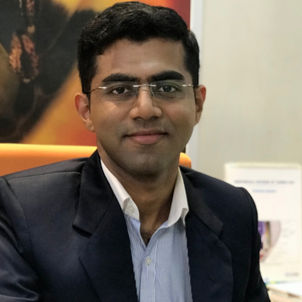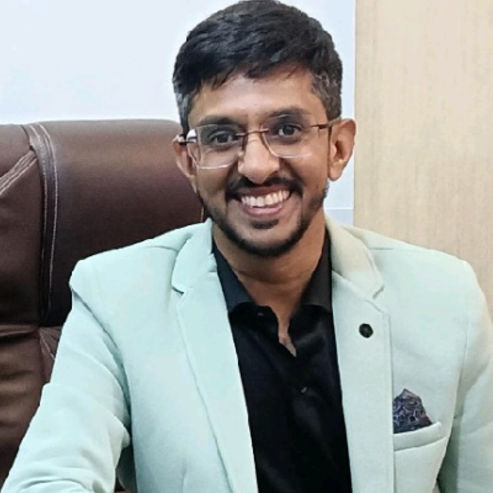Best Ophthalmologists in mumbai (9 doctors)
Book appointment for a trusted Ophthalmologists in Mumbai. Check doctor fees, available slots & locations. Apollo 24|7 features some of the top Ophthalmologists in Mumbai who have experience in treating conditions such as Cataract, Blurred vision, Glaucoma and more. You can book online consultations & physical doctor appointments via Apollo 24|7. Compare Ophthalmologists fees, experience and more, find a specialist doctor near you. Apollo hospitals has a renowned Ophthalmology department in Mumbai.

Dr. Abhishek Hoshing
Ophthalmologist
13 Years • MBBS, DNB, Fellowship in Corneal Transplant Surgery
16 KM • Mumbai
Apollo Hospitals CBD Belapur, Mumbai
50+ recommendations

Dr. Sunil Moreker
Ophthalmologist
25 Years •
16 KM • Mumbai
Apollo Hospitals CBD Belapur, Mumbai

Dr Taran Wanage
Ophthalmologist
16 Years • M.S ophthal ,D.O.M.S Glaucoma Fellowship
16 KM • Mumbai
Apollo Hospitals CBD Belapur, Mumbai

Dr. Devendra Phalak
Ophthalmologist
8 Years •
16 KM • Mumbai
Apollo Hospitals CBD Belapur, Mumbai

Dr. Chintan Dedhia
Ophthalmologist
10 Years • MBBS , MS (Ophthalmology), DNB (Ophthalmology), FLVPEI(Retina & Vitreous)
13 KM • Mumbai
Shree Aadinath Eye & Dental Care, Superspeciality Retina clinic, Mumbai

Dr. Aditya Parmar
Ophthalmologist
3 Years • MBBS, MS Ophthalmology
15 KM • Mumbai
Parmar Eye Care, Mumbai
Book Appointment for Ophthalmologist in Mumbai
Get your vision right with the best ophthalmologist in Mumbai. Our leading super specialty eye specialists will help sift through any issues related to your vision or eye health. Our ophthalmologists in Mumbai can handle online and physical consultations, be it for mere checkups or specialised care. They are committed to offering wholesome eye care befitting your lifestyle and needs.
What do Ophthalmologists do?
In the city of Mumbai, ophthalmologists provide top-notch eye care. They are not just the best in their field; they are your companions on the journey to maintaining your vision and eye health. Here are some of the conditions that an ophthalmologist in Mumbai can treat:
Cataracts
Glaucoma
Macular Degeneration
Diabetic Retinopathy
Dry Eyes
Conjunctivitis
Strabismus
Amblyopia
Blepharitis
Why Visit an Ophthalmologist?
Living in Mumbai, you have access to some of the best eye specialist in Mumbai. But why should you consult with an eye doctor? Here are a few reasons:
Skilled Care: Ophthalmologists in Mumbai have specialised training to diagnose and treat a wide range of eye conditions.
Comprehensive Services: From routine eye exams to surgeries, they provide comprehensive eye care services.
Eye Health Management: For chronic conditions like glaucoma or macular degeneration, ophthalmologists can provide ongoing management and create personalised treatment plans.
Surgical Expertise: If surgery is required, an ophthalmologist is the best specialist to consult. They are trained to perform various surgical procedures safely.
Disease Diagnosis: They can diagnose diseases that may have started to affect your eyes, even before other symptoms become noticeable.
Optimal Vision: Regular visits can help maintain your vision at its best, preventing or slowing the progression of diseases that could lead to vision loss.
Remember, your eyes are a vital part of your health. Make sure they are in the right hands.
What Diseases or Conditions do Ophthalmologists Treat?
If you're looking for the best eye specialist in Mumbai, it's important to know what conditions they can treat. Ophthalmologists are proficient in diagnosing and treating a wide range of eye-related ailments. As the top eye specialist in Mumbai, they're adept at managing these conditions effectively. Here's a list of the most common eye diseases that an eye doctor in Mumbai can help manage:
Cataracts: A condition characterised by the clouding of the lens, often affecting vision due to ageing.
Glaucoma: A set of eye disorders that damage the optic nerve, usually associated with increased intraocular pressure.
Age-Related Macular Degeneration (AMD): A progressive condition that affects the middle part of the retina (macula), leading to loss of vision.
Diabetic Retinopathy: This is damage to the retina caused by diabetes, which can lead to blindness if left untreated.
Dry Eye Syndrome: A condition where eyes don’t produce enough tears or the right quality of tears.
Amblyopia (Lazy Eye): A developmental disorder where one eye fails to achieve normal visual acuity.
Astigmatism: A refractive error caused by an irregularly shaped cornea, leading to blurred vision.
Retinal Detachment: A severe condition where the retina pulls away from its normal position, risking vision loss.
Strabismus: This is a condition where the eyes do not align with each other properly.
Uveitis: Inflammation of the middle layer of the eye (uvea), which can cause pain and vision problems.
What are the Procedures Performed by an Ophthalmologist?
You may approach an ophthalmologist in Mumbai for treatment or consultation related to any eye-related ailment. As highly skilled professionals, they can perform a variety of procedures to restore your vision and maintain eye health. Here are the most common procedures performed by the best ophthalmologists in Mumbai:
Cataract Surgery: A common surgical procedure that involves the removal of the cloudy lens and its replacement with an artificial one.
Laser Eye Surgery (LASIK): This procedure corrects refractive vision issues like myopia, hyperopia, and astigmatism.
Glaucoma Surgery: This includes various surgical options to reduce intraocular pressure, such as trabeculectomy and tube shunt surgery.
Intravitreal Injections: These are injections directly into the vitreous humour of the eye, often used for treating AMD and diabetic retinopathy.
Pterygium Surgery: This involves the removal of a growth on the conjunctiva that can affect vision.
Retinal Detachment Surgery: This procedure reattaches a detached retina to the back of the eye.
Corneal Transplant: This involves replacing a damaged cornea with a healthy donor cornea.
YAG Laser Capsulotomy: A procedure used to treat clouding occurring after cataract surgery.
Strabismus Surgery: This surgical correction helps align misaligned eyes.
Uveitis Treatment: This includes various procedures and medications to manage inflammation within the eye.
So, whether you're looking for treatment or preventive care, remember that an ophthalmologist in Mumbai is well-equipped to handle your eye health needs. Choose wisely and ensure a clear vision for years to come!
How Can I Find the Best Ophthalmologist in Mumbai Near Me?
With just a tap on your smartphone, getting the best eye specialist in Mumbai is easy. Download the Apollo 24|7 app and go through the profiles of our leading ophthalmologists in Mumbai, check out their reviews, and decide whom you would like to consult with.
You will have all the best options, which include clinics or even online consultation possibilities. Book an ophthalmologist in Mumbai through Apollo 24|7, and be certain that you are in safe hands when it really matters. Do not wait; make your booking.
Ophthalmologists in top localities of mumbai
- •Best Ophthalmologists in Parel, Mumbai
- •Best Ophthalmologists in Stock Exchange, Mumbai
- •Best Ophthalmologists in Bazargate, Mumbai
- •Best Ophthalmologists in Mumbai G.P.O., Mumbai
- •Best Ophthalmologists in Tajmahal, Mumbai
- •Best Ophthalmologists in M.P.T., Mumbai
- •Best Ophthalmologists in Town Hall, Mumbai
- •Best Ophthalmologists in S. C. Court, Mumbai
- •Best Ophthalmologists in Thakurdwar, Mumbai
- •Best Ophthalmologists in Kalbadevi H.O, Mumbai
- •Best Ophthalmologists in Mandvi, Mumbai
- •Best Ophthalmologists in Masjid, Mumbai
- •Best Ophthalmologists in Null Bazar, Mumbai
- •Best Ophthalmologists in B.P.Lane, Mumbai
- •Best Ophthalmologists in Girgaon, Mumbai
- •Best Ophthalmologists in Chaupati, Mumbai
- •Best Ophthalmologists in Ambewadi, Mumbai
- •Best Ophthalmologists in Opera House, Mumbai
- •Best Ophthalmologists in Madhavbaug, Mumbai
- •Best Ophthalmologists in Charni Road, Mumbai
Ophthalmologists in nearby Cities
Related Treatments in Mumbai
- •Treatment for Black Eye in Mumbai
- •Treatment for Age Related Macular Degeneration in Mumbai
- •Treatment for Age Related Macular Degeneration Treatment in Mumbai
- •Treatment for Anti Vegf in Mumbai
- •Treatment for Anti Vegf Uvea in Mumbai
- •Treatment for Aphakia in Mumbai
- •Treatment for Astigmatism in Mumbai
- •Treatment for Blindness in Mumbai
- •Treatment for Adopted Child Syndrome Treatment in Mumbai
- •Treatment for Ankle Pain in Mumbai
- •Treatment for Bags under eyes in Mumbai
- •Treatment for Blood in Eye in Mumbai
- •Treatment for Bloodshot Eye in Mumbai
- •Treatment for Abdominal aortic aneurysm in Mumbai
- •Treatment for Acute Diarrhea Treatment in Mumbai
- •Treatment for Adenomyosis in Mumbai
- •Treatment for Benign Essential Blepharospasm in Mumbai
- •Treatment for Black Fungus in Mumbai
- •Treatment for Blurriness in Mumbai
- •Treatment for Breathing Problems in Mumbai
FAQs
Which doctor is best for eyes?
Ophthalmologist is the doctor for comprehensive eye care. They are medical doctors (MDs or DOs) who have completed specialized training in diagnosing and treating all eye diseases and conditions, including performing surgery.
When should I consult an ophthalmologist?
You should consult an ophthalmologist if you experience any of the following:
Sudden vision changes (blurry, double, loss of vision)
Eye pain or discomfort
Redness or swelling of the eye
Flashes of light or floaters
Difficulty focusing
Dry eyes
Changes in your field of vision
Eye injuries
Family history of eye disease (glaucoma, macular degeneration)
Who is called an ophthalmologist?
An ophthalmologist is a medical doctor who specializes in the diagnosis and treatment of all eye diseases and conditions.
Is ophthalmologist a MBBS doctor?
Yes, ophthalmologists are medical doctors who have completed an MBBS (Bachelor of Medicine, Bachelor of Surgery) degree followed by specialized training in ophthalmology.
Do ophthalmologists treat eyelids?
Yes, ophthalmologists treat conditions affecting the eyelids, such as:
Drooping eyelids (ptosis)
Eyelid inflammation (blepharitis)
Styes and chalazia
Tumors of the eyelid
Which doctor is best for eyesight?
While both ophthalmologists and optometrists can examine your eyesight, ophthalmologists have the broader medical training to diagnose and treat a wider range of eye diseases and conditions
What are the signs of vision loss?
Signs of vision loss can include:
Blurred vision
Double vision
Loss of peripheral vision
Difficulty seeing at night
Halos around lights
Frequent eye strain
Needing more light to read
What causes eye pain?
Eye pain can have various causes, including:
Eye strain
Dry eyes
Foreign objects in the eye
Eye infections (conjunctivitis, keratitis)
Glaucoma
Uveitis
Migraine headaches
Why is my vision blurry?
Blurry vision can be caused by many factors, such as:
Refractive errors (nearsightedness, farsightedness, astigmatism)
Uncorrected vision problems
Eye strain
Cataracts
Macular degeneration
Diabetes
High blood pressure
Can lost eyesight be recovered?
The extent of vision recovery depends on the underlying cause of vision loss. Some conditions, like cataracts, can be treated effectively and vision can be restored. Other conditions, such as advanced glaucoma or macular degeneration, may result in permanent vision loss.
How many types of eye treatments are there?
There are many types of eye treatments, including:
Eyeglasses and contact lenses
Medications (eye drops, oral medications)
Laser surgery (LASIK, PRK)
Cataract surgery
Glaucoma surgery
Retinal surgery
What is the most common eye surgery?
Cataract surgery is one of the most common eye surgeries performed.
Is eye surgery a risk?
All surgeries carry some degree of risk, including eye surgery. However, with advancements in technology and surgical techniques, the risks associated with eye surgery are generally low.
Is optometrist a surgeon?
No, optometrists are not surgeons. They are eye care professionals who can diagnose and treat vision problems, but they cannot perform surgery.